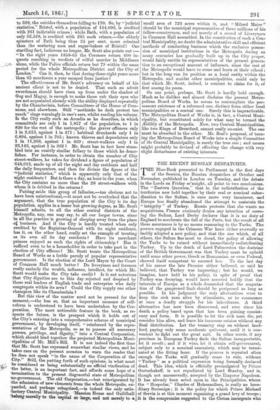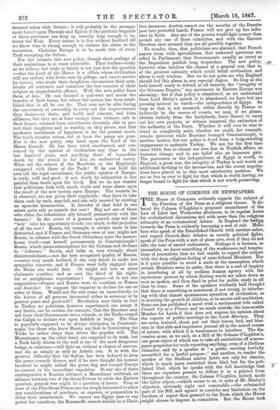THE RECENT RUSSIAN DESPATCHES.
THE Blue-Book presented to Parliament in the first days of the Session, the Russian despatches of October and November, published in London on Tuesday, and the debate in the Lords on Friday so'nnight, all point to two conclusions.
The "Eastern Question," that is, the redistribution of the territories now held together by their real or nominal subor- dination to the Sultan, is once more very imminent, and Europe has finally abandoned the attempt to maintain the integrity " of Turkey. Russia protests that she wants no acquisitions, France anxiously denies any intention of coerc-
ing the Sultan, Lord Derby declares that it is no duty of England to accelerate the fall of the Porte, but the result of all these assurances is by no means reassuring to the Turks. The powers engaged in the Crimean War have either avowedly -or tacitly adopted a new policy, and that the one which, of all others, the Sultan has most to dread, the policy of allowing the Turks to be ruined without immediately redistributing Turkey. Up to the death of Lord Palmerston the doctrine of the British Government was that Turkey must be upheld until some other power, Greek or Roumanian, or even Federal, showed itself competent to succeed her. To the last day of his career the late Premier either believed, or said he believed, that Turkey was improving ; but he would, we imagine, have held to his policy, in spite of proof that Turkey was decaying, would have asserted boldly that the interests of Europe as a whole demanded that the amputa- tion of the gangrened limb should be postponed as long as possible. In his judgment the only alternatives were to keep the sick man alive by stimulants, or to commence at once a deadly struggle for his inheritance. A third alternative has now been discovered, and ever since his. death a policy based upon that has been gaining consiat- ency and form. It is possible to let the sick man die, yet consider him alive, and leave his immense estates without any final distribution. Let the tenantry stay on without land- lord, paying only some moderate quit-rent, until it is con- venient to fight out the great suit. In other words, if any province in European Turkey finds the Sultan insupportable, let it revolt ; and if it wins, let it obtain self-government, subject only to a nominal suzerainty, which may be termi- nated at the fitting hour. If the process is repeated of ten enough the Turks will gradually cease to rule, without " Turkey " as a political expression being formally declared dead. This idea, which is officially promulgated by Prince Gortschakoff, is not repudiated by Lord Stanley, and is, though not unreservedly, accepted by the Emperor Napoleon. It has already been acted upon in the Principalities, where the " Hospodar," Charles of Hohenzollern, is really an here- ditary Sovereign ; it is the policy for which Prince Michael of Sonia is at this moment organizing a grand levy of troops ; it is the compromise suggested to the Cretan insurgents who
-demand union with Greece ; it will probably be the arrange- ment forced upon Thessaly and Epirus if the patriotic brigands .crf those provinces can keep up anarchy long enough to in- terest the West. Every tenant is to lire without landlord till we know who is strong enough to enforce his claim to the succession. Christian Europe is to be made free of every Turk excepting the Sultan.
For the tenants, this new policy, though short perhaps of -their aspirations, is at worst endurable. They declare—truly
as we believe, but truly or falsely is not just now the question —that the Lord of the Manor is a villain whom civilization will not endure, who levies rent by pillage, and exacts service 43y torture, who steals their daughters, circumcises their sons, breaks all contracts, and considers the free exercise of their religion an unpardonable offence. Well, the new policy frees them of him. He can demand a quit-rent and arrest the transfer of their farms, but where the system has been estab- lished that is all he can do. They may not be able during the uncertainty of ownership to carry out the improvements -they desire—to drain, and build, and educate, and form .alliances, but they are at least exempt from violence, safe in their homes, released from extortionate demands, able to pro- tect their daughters and to worship as they please, and that moderate instalment of happiness is for the present much. The tooth remains rotten, but at least the pangs are gone.
Nor is the new policy very hard upon the Lord of the _Manor himself. He has been tried, condemned, and sen- tenced by the opinion of civilization any time in the last hundred years, and anything short of immediate death by the sword is for him an undeserved mercy. What are the crimes of the Bourbons or the Hapsburgs compared with those of the Turk ? If he can hold his own till the legal executioner, the public opinion of Europe, is ready, well and good ; if not, death by exhaustion is less painful than death upon the block. But we do not wonder that politicians look with much doubt and some alarm upon the result of the new system upon Europe. The tenants, be it observed, are not given their copyholds ; they have to take them each by each, may fail, and can only succeed by exciting an agrarian insurrection. Is disorder of that kind in one estate quite safe as regards the rest May not one of those
',who claim the inheritance ally himself prematurely with the tenants ? In the event of a general quarrel, may not one
"heir" seize his opportunity to take too much, to the prejudice of all the rest ? Russia, for example, is always more or less distrusted, and if France and Germany were at war, might not Russia, in alliance with the Greek Christians, seize the manor-
house itself—seat herself permanently in Constantinople ? Russia, which raises subscriptions for the Cretans, and declines -to " influence " Servia, and talks so very strongly about disinterestedness,—not the best recognized quality of Russia,
—seems very much inclined, if she only dared, to make her .sympathy concrete, and if France were fully engaged upon the Rhine she would dare. Or might not two or more claimants combine, and so oust the third of his right- ful or unrighteous expectations ? Suppose—it is not our supposition—France and Russia were to combine, or France and Austria ? Or suppose the tenantry to declare for one or other of them. Would not the suit come on immediately, to the horror of all persons interested either in economy or in -general peace and good-will ? Revolution once fairly on foot in Turkey, no politician, however experienced, can assign it any limits, can be certain, for example, that the Russians may
not force their Government into a crusade, or the Turks compel the Caliph to declare war upon Infidels at large. The Czar is popularly supposed to be always intriguing in Constanti- nople, but those who know Russia say that in threatening the Turks he rather obeys than drives the popular will. The
Mussulmans, on the other hand, are supposed to be weak, but a Turk fairly driven to the wall is one of the most dangerous beings in existence—will fight on without a chance of success, and die as calmly as only an Asiatic can. It is with the greatest difficulty that the Sultan has been induced to keep the peace towards Greece, and if he once thought his honour involved he might unfurl the green flag, and compel Europe to consent to his immediate expulsion. In any one of these contingencies, a Russian advance, a Mussulman outbreak, an alliance between two of the Great Powers to settle the Eastern question, general war might be a question of hours. Four at least of the Five Great Powers are too deeply interested to allow any considerations of prudence, or expense, or preparation to delay their interference. We cannot see Egypt pass to any power but ourselves, the Romanoffs cannot submit to a Chris- tian massacre, Austria cannot see the mouths of the Danube pass into powerful hands, France will not give up her influ- ence in Syria. Any one of the powers would fight sooner than permit any one of these calamities, and with the Eastern Question once aroused they are all possible together.
No wonder, then, that politicians are alarmed, that French papers teem with speculations, that awkward questions are asked in Parliament, that Governments usually as secret as the 'Inquisition publish long despatches. The new policy, however wise, involves the chance of a general war, that is, of the greatest calamity which could befall civilization, and alarm is only wisdom. But we do not quite see why England should feel this alarm in any especial degree. So long as she held herself ready to defend, at all hazards, the "integrity of the Ottoman Empire," any movement in Eastern Europe was alarming ; but if that policy is abandoned, as we understand from Lord Derby's speech it is abandoned, we have but one pressing interest to watch—the independence of Egypt. So long as that is not menaced, either directly by France or indirectly by the course of events, we may, if we please, abstain entirely from the hurlyburly, leave Greece to carry out her own projects, or witness unmoved the extinction of the authority of the Porte. Whether it will ever be wise to stand so completely aside, whether we could, for example, remain quiescent while Russians besieged Constantinople, is another matter, but our policy is fraed from a long-standing engagement to maintain Turkey. We are, for the first time since 1856, free to choose our own line in Turkish affairs, an immense change, and in our belief also an immense gain. The possession or the independence of Egypt is worth, to England, a great war, the integrity of Turkey is not worth an additional farthing to the income-tax, and the recent negotia- tions have placed us in this most satisfactory position. We are as free as ever to fight for that which is worth having, no longer bound to fight for that which is not worth preserving.































 Previous page
Previous page